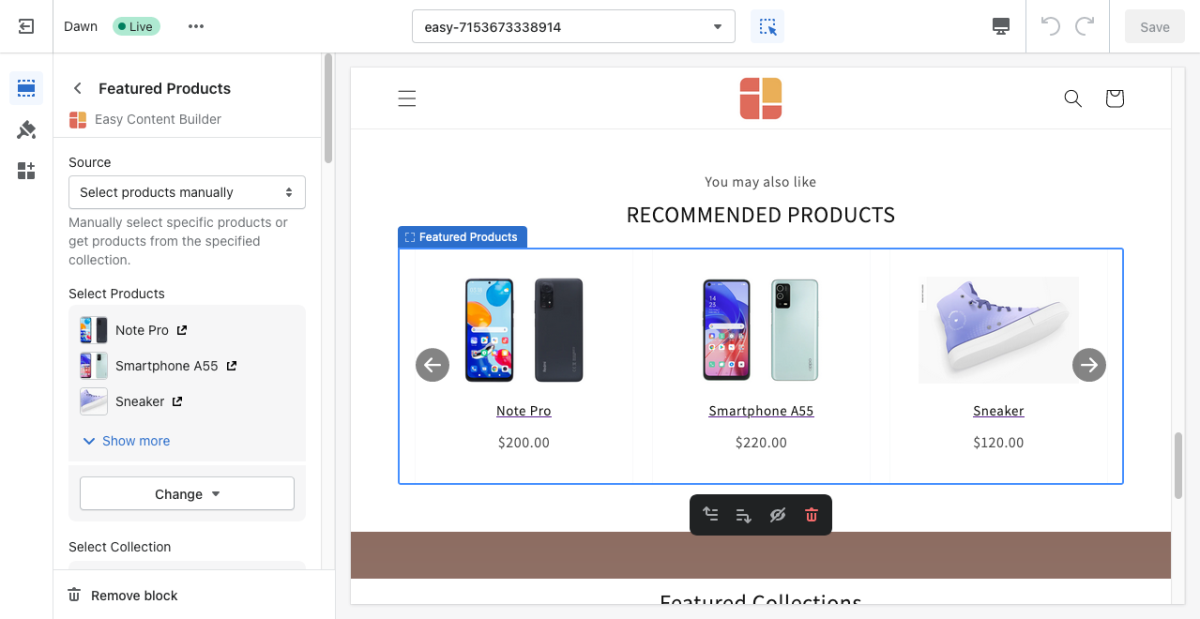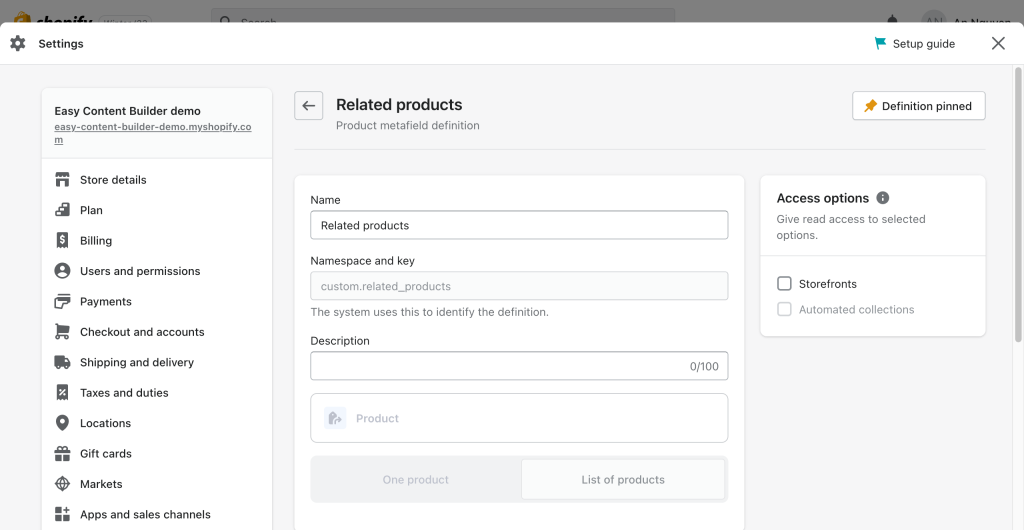Block Featured Products: Difference between revisions
mNo edit summary |
mNo edit summary |
||
| Line 79: | Line 79: | ||
'''<u>NOTE</u>''': Adding Related Products using the Dynamic sources best fits when you want to apply the same template to many products, and each product comes with its specific (dynamic) list of Related Products. | '''<u>NOTE</u>''': Adding Related Products using the Dynamic sources best fits when you want to apply the same template to many products, and each product comes with its specific (dynamic) list of Related Products. | ||
'''<u>Info</u>''': Dynamic sources link the product data as a metafield to section input settings, which lets you add metafields to pages right from the theme editor. Shopify offers different types of metafields to add custom data to a specific part of your Shopify store. Learn more here. | '''<u>Info</u>''': Dynamic sources link the product data as a metafield to section input settings, which lets you add metafields to pages right from the theme editor. Shopify offers different types of metafields to add custom data to a specific part of your Shopify store. Learn more [https://help.shopify.com/en/manual/custom-data/metafields here]. | ||
'''Step 1: Create a metafield definition for the Related Products''' | '''Step 1: Create a metafield definition for the Related Products''' | ||
Revision as of 08:58, 15 March 2023
This content block allows you to easily create an attractive product slider for custom chosen products or an entire collection.
From the Shopify theme editor, click on Featured Products on the sidebar to view the details of settings.
(If you’re new to our Easy Content Builder, please refer to section Add App Sections and Add ECB Blocks for more details on how to create and edit a section or a block.)
| Section settings | Description |
|---|---|
| Source | Select the source of products that you want to feature:
|
| Select Products | Use this setting when you set Source to Select products manually. Use the Search bar to search for a specific product term or select the products available in the list. |
| Select Collection | Use this setting when you set Source to Products in collection. Use the Search bar to search for a specific collection term or select the product collection available in the list. |
| Limit Products | The maximum number of products that you can feature in the Featured Product section. |
| Item Style | Custom CSS classes applied to the item wrapper. E.g. (without quotation mark): `card py-5 px-3 h-100` or `bg-warning p-5 h-100` |
| Text Alignment | Align the Products’ title and price to the left, right, or center. |
| Image Width | Set the width (in pixel) of the collection’s featured image. |
| Image Height | Set the width (in pixel) of the collection’s featured image. |
| Image Crop | Cut out a part of the image: Top, Left, Bottom, Right, Center. |
| Image Border | Set the style of the image border: square, rounded, or thumbnail. |
| Items per row (Mobile) | Set the number of collections displayed per row on Mobile devices (Less than 576px). |
| Items per row (Tablet) | Set the number of collections displayed per row on Tablet devices (576px - 991px). |
| Items per row (Desktop) | Set the number of collections displayed per row on Desktop devices (992px and up). |
| Slider settings - Show Slider Arrows | Show or hide the slider arrows. |
| Slider settings - Auto Play | Change slides of products after a specified interval (in milliseconds). Enter 0 to disable. |
| Slider settings - Animation duration | Duration of the sliding animation (in milliseconds). |
| Padding Top | Set the padding top (in px) of the block. |
| Padding Bottom | Set the padding bottom (in px) of the block. |
| Margin Top | Set the margin top (in px) of the block. |
| Margin Bottom | Set the margin bottom (in px) of the block. |
Part 2: Add Related Product section using Dynamic sources:
Besides the default option - Select products manually mentioned in Part 1 above, you can also display the Related Products using Dynamic sources.
NOTE: Adding Related Products using the Dynamic sources best fits when you want to apply the same template to many products, and each product comes with its specific (dynamic) list of Related Products.
Info: Dynamic sources link the product data as a metafield to section input settings, which lets you add metafields to pages right from the theme editor. Shopify offers different types of metafields to add custom data to a specific part of your Shopify store. Learn more here.
Step 1: Create a metafield definition for the Related Products
- From your Shopify admin, click Settings > Custom Data
- Click Products > click Add definition
- In the Product Metafield definition form, assign a namespace (the group that your metafield will belong to) and a key (the specific metafield name) as follows:
- Name: Related products
- Namespace and key: custom.related_products
- Description: (optional)
- Select type > Product, make sure you enable List of Product.
Step 2: Add value to the metafield
- From your Shopify admin > click Products > click the Product you want to add Related Product section.
- Scroll down to the Metafield section > click Related Products field to select the products you want to display as Related Product:
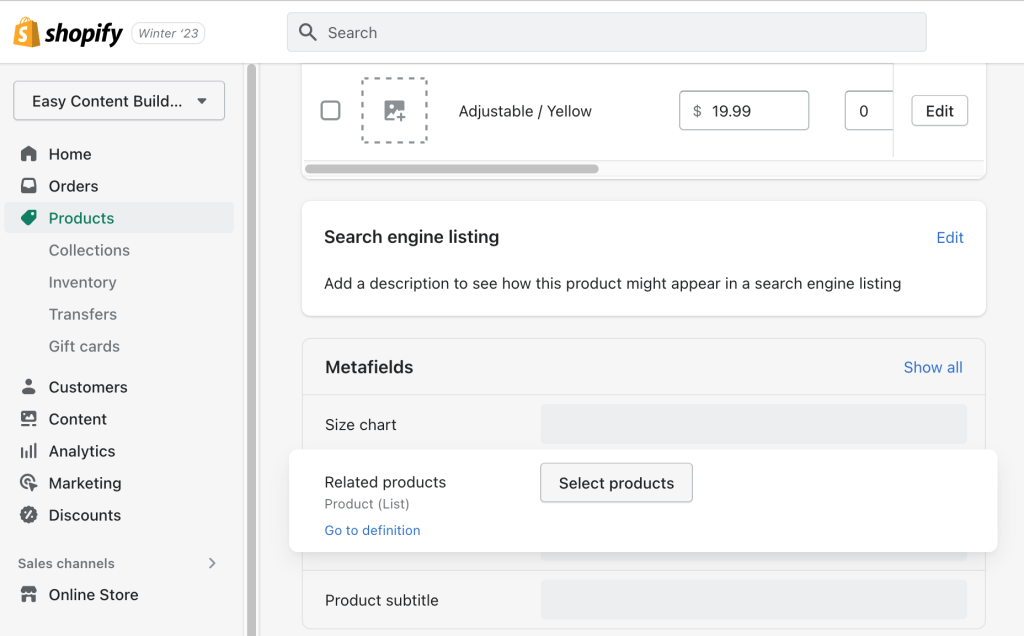
Step 3: Link the product metafields to your template
- From your Shopify admin, click Apps > Easy Content Builder
- Click Manage Templates > find the template of the product you want to edit, then click Customize
- Navigate to the section you want to add the Related Products.
- For example: you add Related Products to the core Product section, simply click Add block > click Featured Products:
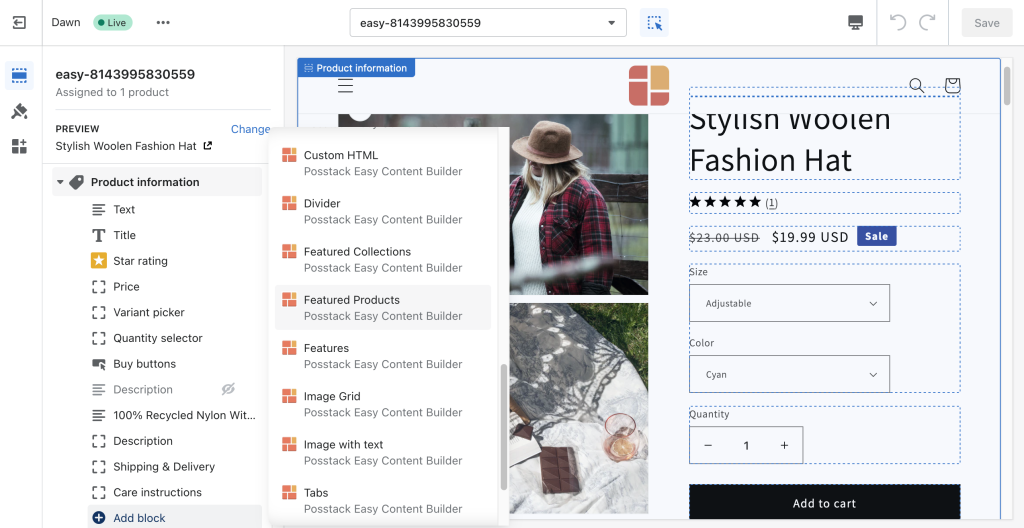
- Open the Featured Products section you’ve just created > click the connect dynamic source icon next to the Select Products field > click Related Products > then click Save to apply the changes to the storefront.
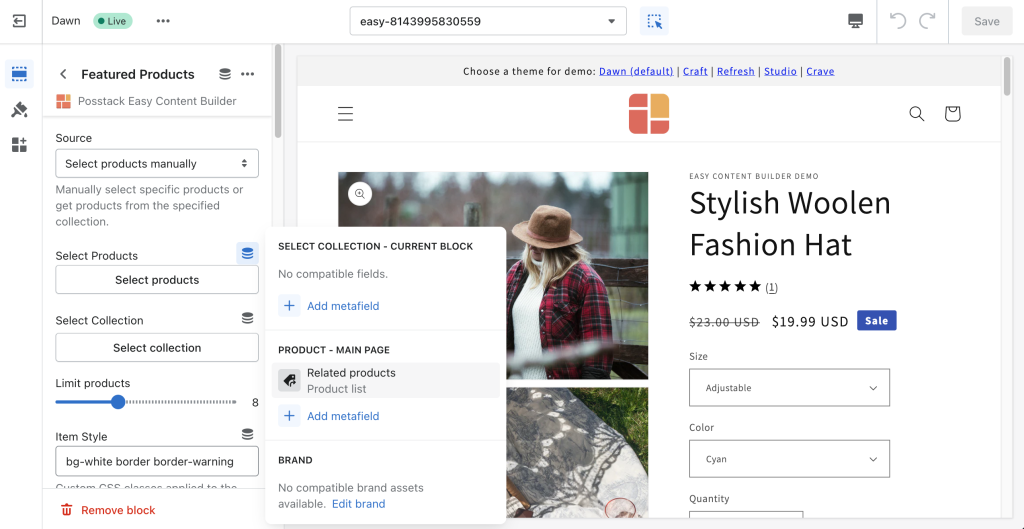
- Once you assign the related products using dynamic sources, you can edit and change the products your way through the Theme Editor.
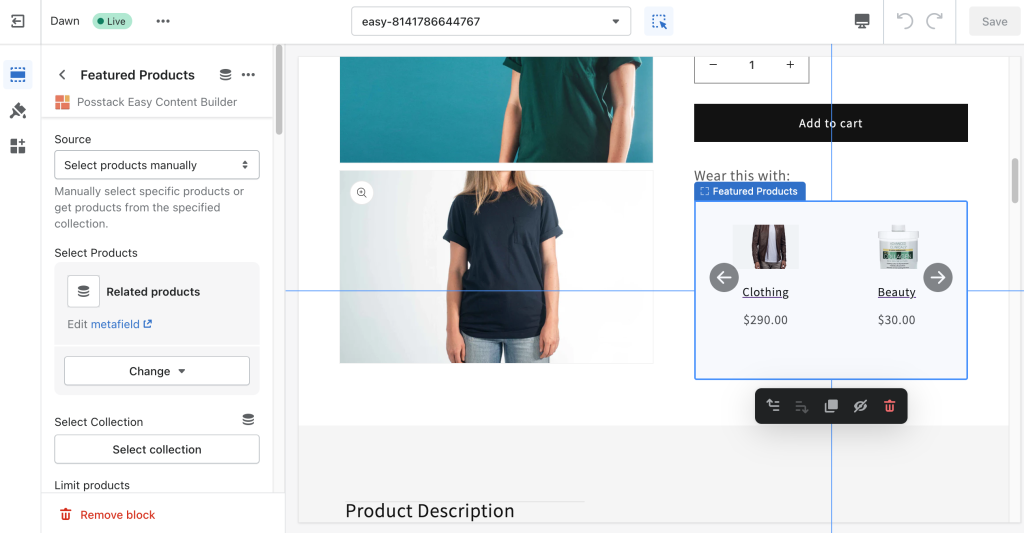
- For example: you add Related Products to the core Product section, simply click Add block > click Featured Products:
